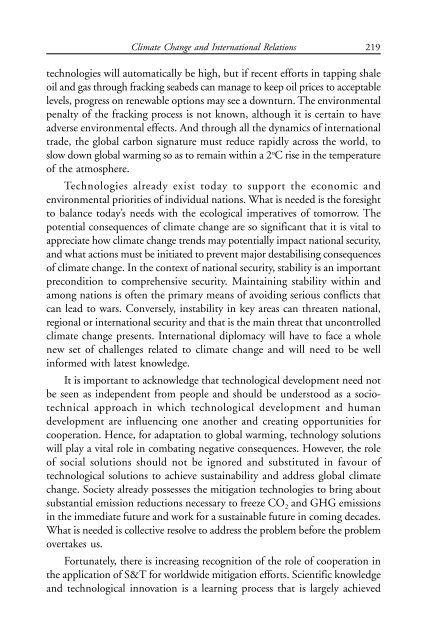ROLE OF TECHNOLOGY INTERNATIONAL AFFAIRS
book_role-of-technology-in-international-affairs_a-mallik_1
book_role-of-technology-in-international-affairs_a-mallik_1
Create successful ePaper yourself
Turn your PDF publications into a flip-book with our unique Google optimized e-Paper software.
Climate Change and International Relations<br />
219<br />
technologies will automatically be high, but if recent efforts in tapping shale<br />
oil and gas through fracking seabeds can manage to keep oil prices to acceptable<br />
levels, progress on renewable options may see a downturn. The environmental<br />
penalty of the fracking process is not known, although it is certain to have<br />
adverse environmental effects. And through all the dynamics of international<br />
trade, the global carbon signature must reduce rapidly across the world, to<br />
slow down global warming so as to remain within a 2 o C rise in the temperature<br />
of the atmosphere.<br />
Technologies already exist today to support the economic and<br />
environmental priorities of individual nations. What is needed is the foresight<br />
to balance today’s needs with the ecological imperatives of tomorrow. The<br />
potential consequences of climate change are so significant that it is vital to<br />
appreciate how climate change trends may potentially impact national security,<br />
and what actions must be initiated to prevent major destabilising consequences<br />
of climate change. In the context of national security, stability is an important<br />
precondition to comprehensive security. Maintaining stability within and<br />
among nations is often the primary means of avoiding serious conflicts that<br />
can lead to wars. Conversely, instability in key areas can threaten national,<br />
regional or international security and that is the main threat that uncontrolled<br />
climate change presents. International diplomacy will have to face a whole<br />
new set of challenges related to climate change and will need to be well<br />
informed with latest knowledge.<br />
It is important to acknowledge that technological development need not<br />
be seen as independent from people and should be understood as a sociotechnical<br />
approach in which technological development and human<br />
development are influencing one another and creating opportunities for<br />
cooperation. Hence, for adaptation to global warming, technology solutions<br />
will play a vital role in combating negative consequences. However, the role<br />
of social solutions should not be ignored and substituted in favour of<br />
technological solutions to achieve sustainability and address global climate<br />
change. Society already possesses the mitigation technologies to bring about<br />
substantial emission reductions necessary to freeze CO 2 and GHG emissions<br />
in the immediate future and work for a sustainable future in coming decades.<br />
What is needed is collective resolve to address the problem before the problem<br />
overtakes us.<br />
Fortunately, there is increasing recognition of the role of cooperation in<br />
the application of S&T for worldwide mitigation efforts. Scientific knowledge<br />
and technological innovation is a learning process that is largely achieved


